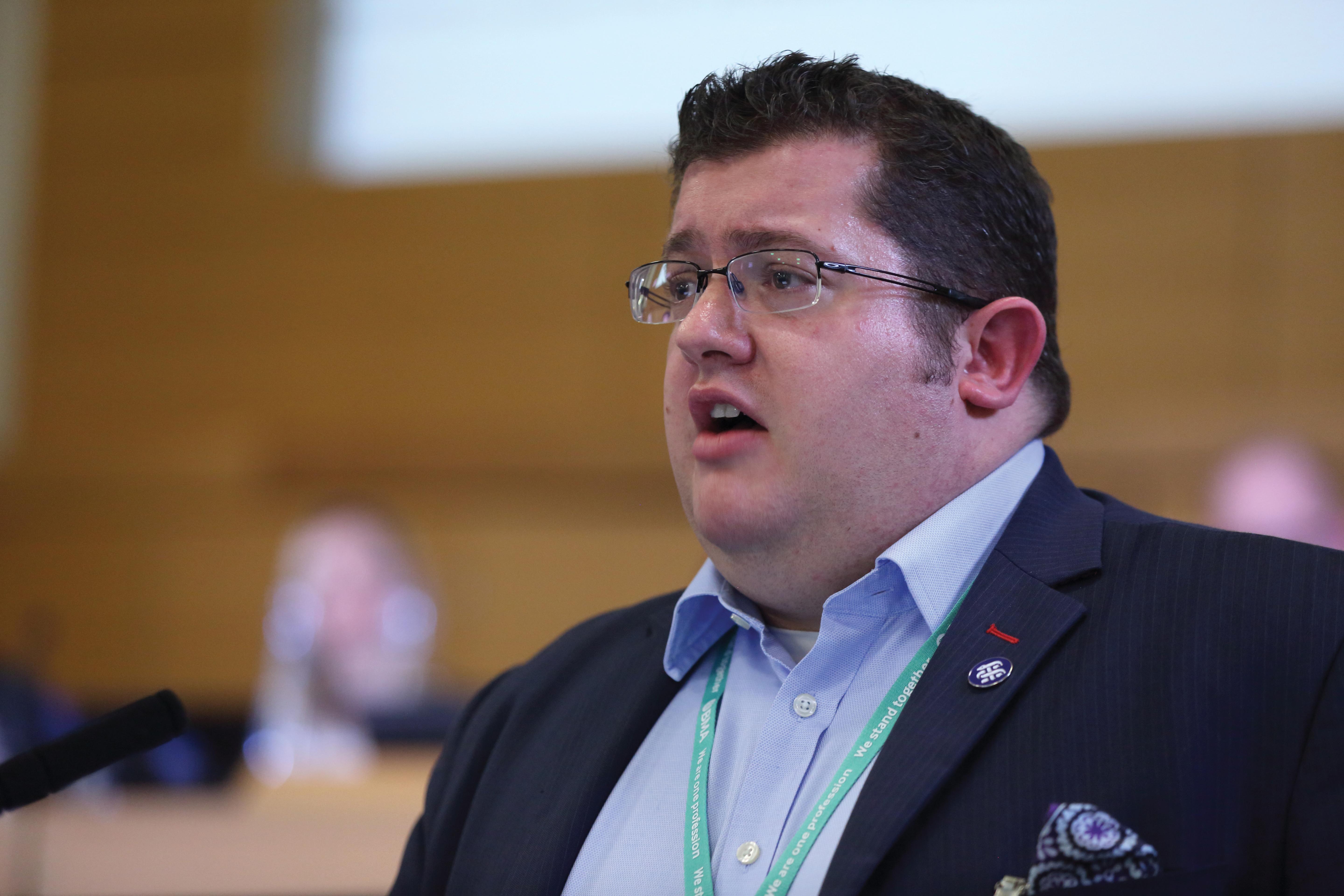‘Every day it’s winter. Every day we’re preparing for winter, and every day we’re in crisis mode. When will spring and summer come? The healthcare family in Northern Ireland is so tired – and you really can’t fix that overnight.’
Belfast GP Ursula Brennan sounds despairing. Although she welcomes the return of devolution to Northern Ireland and is hopeful that it might begin to repair some of the long-standing damage to the country’s health and care system, she can’t help but fear it might have come too late.
 GP Ursula Brennan
GP Ursula Brennan
‘We’ve had no government for two years, so there’s been a hiatus; I get that,’ she says. ‘But the place feels like it’s been on fire. Our roads are in a desperate state, our schools are in a desperate state as well, and health is just the worst I have seen it.
‘I have elderly patients sitting on plastic seats for hours and hours; I don’t want to send patients to A&E because I know their experience is going to be horrific.
‘Sometimes I’m looking at patients thinking “what’s going to be the least worst thing I can do for you?” – knowing that it’s not what I want for them in their health and social care journey. It’s really distressing because I don’t know how we can get a lot of this fixed.’
Dr Brennan isn’t alone in her views. The Doctor spent some time in Northern Ireland the week after Stormont started sitting again and heard from doctors from different branches of practice as well as patients and members of the general public. And the consensus was that, while people wanted to be optimistic, grim experience had all but hammered out any possibility of hope.
‘Something has to be done about the health service,’ says Siobhan Quinn, an associate specialist who works in the emergency department of Belfast’s Royal Victoria Hospital.
‘I was pleased when I saw signs that the [politicians] were about to come to some sort of agreement, because I thought maybe at least we’ll see some movement, because the health service is failing – if it hasn’t failed already. My patients that I see every day at work are suffering because of its failings.’
Dangerous waits
Patients and their families feel in a terrible position, she says, because they are told there will be long waits for an ambulance, even if they are in pain and in need of care. ‘I’ve had two patients with fractured neck femurs who have been brought in, in a car because they’ve been told it will be some hours before an ambulance gets to them.
‘My friend’s husband had chest pain last week and phoned for an ambulance and was told it would be more than an hour, so she brought him to hospital – he had an infarct and was taken to the cath lab. It’s a dangerous thing to put someone with chest pain into a car, but she felt she had no choice.’
All this has a knock-on effect on healthcare staff.
‘As a doctor, whenever you see how people are treated in the emergency department, you feel bad. You feel sorry for the patients that are treated in such an undignified way. You feel sorry for the loved ones who can’t be with their relatives because of the crowding, and then you start to see the effect it has on yourself as well, because you feel when you’re going into work, you’re not necessarily making the difference that you thought you were going to make.’
The health service is failing – if it hasn’t failed alreadySiobhan Quinn
She has a very clear wish list for the new health minister, Robin Swann, and his colleagues. She wants to see more focus on social care, and for care staff to be valued and paid properly to improve flow in and out of hospital.
She also wants measures to retain doctors, including improved pay and – specifically for specialist, associate specialist and specialty doctors – better career progression.
Meanwhile, she and her colleagues are taking decisions they never thought they would, such as moving to the Republic of Ireland to work, or taking early retirement.
‘I didn’t think I’d be retiring at 60 – I thought I’d go on longer than that, because I like my job,’ says Dr Quinn. ‘But now it’s all about trying to manage the department and manage the crowding. And for the people leaving to go to Australia or Canada or the Republic of Ireland, it’s not all about the money, although it’s a factor. But the waiting lists for treatment are a lot shorter – you can see someone, put them on a waiting list, and know the wait won’t be that long. That must give you a lot more job satisfaction than we have here.’
 GP trainee Fiona Griffin
GP trainee Fiona Griffin
Fiona Griffin is a GP trainee working in hospital. Having worked in Scotland before moving back to her native Northern Ireland, she is outraged at how poor terms and conditions are, and is determined to drive change.
‘My own experience of being a junior doctor in Aberdeen was very different to what it is here in Northern Ireland, and our circumstances are much worse. In Scotland there are more rota protections, time off after night shifts, better protections for working hours, how many long shifts you can do, how many days you can work in a row. These are things we don’t have here.’
Like Dr Quinn, she has seen doctors opting to leave Northern Ireland for better pay and work-life balance elsewhere – adding to the strain on already tight rotas. ‘So many of my colleagues have been leaving to go to Australia, or to New Zealand, or to leave medicine altogether within their first two or three years. That’s such a waste.’
Making it work
She is aware she could move to another country if she wanted – but doesn’t see why she should.
‘I have commitments to stay in this country, and why should we leave? This is where I grew up, the community that raised me. There’s never a day that I don’t meet someone in the hospital or as a patient that I don’t know from having lived there. Why should I just be expected to clear off? I want to make this work for the people who have paid their taxes and have raised their kids here to be part of the community as well. But that’s not the way it is, and we’re failing these people.’
Since Dr Griffin spoke to The Doctor, junior doctors in Northern Ireland voted overwhelmingly for industrial action and the first strike took place on 6 March.
Commitment to full pay restoration for doctors would help retain staff, she says, which would be a good start. But steady, recurrent funding is needed to tackle other long-standing issues, such as long waiting times.
Whether the restoration of devolution will make a difference, she doesn’t know. ‘Is a minister going to be able to fix things in one fell swoop? Absolutely not. Do I think the health service is beyond repair? I think it might be. I consider myself an optimist but it’s hard to see optimism when you see how far things have come.’
‘Everything is broken’
Tom Black, chair of BMA Northern Ireland council, is sounding unusually downbeat – even angry – when The Doctor visits him in his practice in the deprived Bogside area of Derry.
While having politicians back in Stormont is better than having no politicians, he fears it’s come too late.
 BMA Northern Ireland council chair Tom Black: ‘Health service has collapsed’
BMA Northern Ireland council chair Tom Black: ‘Health service has collapsed’
‘The health service has collapsed,’ he says bluntly. ‘It’s difficult to get through to a GP even though GPs are talking to and seeing more patients than ever. It’s difficult to get an ambulance – there’s a danger now that people are being harmed by poor ambulance response times. We can’t get patients seen by surgeons, when they really need to be seen.
‘We can’t solve the health service in Northern Ireland, not when we’re haemorrhaging staff across the border, not when we don’t have adequate resources. I hope that now [that devolution has been restored], they’ve finally got their act together, that things become more sensible. But at the moment, everything is broken, and nothing works.’
He comes to the end of his six years as BMA Northern Ireland chair this summer, and will be handing the baton to someone else. It’s fair to say his successor will have their work cut out, whether Stormont is sitting or not.
Hopes fading
Doctors’ optimism dented after meeting with Department of Health
 BMA NI consultants committee chair David Farren
BMA NI consultants committee chair David Farren
David Farren admits he was hopeful when the news broke that Stormont was sitting once more. But now, after a disappointing first meeting with officials, the chair of the Northern Ireland consultants committee is feeling quite the opposite.
‘If you’d spoken to me before I went to the meeting with the Department of Health last week, I’d have said actually, I’m quite optimistic. Time and time again at meetings we’d been told that they couldn’t make a decision without a minister; that was the barrier. But now that barrier has been removed because we have got a minister.
‘We went into that meeting thinking one barrier had been removed – but another had been erected.’
Officials had previously blamed the fact that Stormont wasn’t sitting for many problems, including the fact that doctors hadn’t yet been paid even the 6 per cent pay uplift recommended by the Review Body on Doctors’ and Dentists’ Remuneration for the current financial year.
Now, he says, officials have told him they don’t know if it can be paid until the next financial year, potentially creating problems with tax and pensions if doctors technically receive two uplifts in one year. Officials also told them that negotiations on pay and conditions could only take place after the conclusion of negotiations in England, despite health being a devolved matter.
Do I stay where I am, and take home less money in an under-resourced system where I’m not valued?David Farren
Consultants have had enough, he says, and many are voting with their feet. Soon, he might be among them. ‘In an ideal world I would quite happily stay here – I love my job,’ says Dr Farren, a consultant microbiologist with the Northern Health and Social Care Trust. ‘I love what I do for a living, and I will continue to do that job; the question mark is where I will continue to do it.’
He has looked at posts in the Republic of Ireland, he says. ‘I’m left with a choice – do I stay where I am, and take home less money in an under-resourced system where I’m not valued? Or do I slightly increase my commute and apply for a job in the Republic of Ireland where my take-home pay will be twice what I currently receive, I will receive a generous study budget to do things that will further my education and give me more skills, in a system where doctors are valued and the health service is being resourced adequately? It’s very difficult to balance up.’
(photo credit: August Schwerdfeger)


